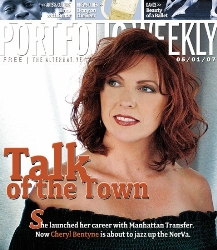We’ve all heard it said that we shouldn’t put all our eggs in one basket. But Dianne Reeves decided to ignore that advice at a young age and focus on the one thing that she knew she wanted to do.
“When I was in junior high school,” she told me recently, “that’s when I really found my voice. My voice was big and I had an understanding of music that seemed a little older than what I was. I loved the way it made me feel, and I loved that it gave me an opportunity to communicate with people on a level that had nothing to do with words. It was my first time accessing spirit in school. I really loved it and that’s when I knew. I was about twelve years old.
“As a matter of fact, I knew it so well that I said, ‘I’m putting all my eggs in one basket.’”
Those eggs cooked up very nicely, and Reeves, who’ll be at the Suffolk Center for Cultural Arts Tuesday night, has become one of the top jazz singers in the world. She won Grammy Awards for Best Jazz Vocal Performance for three straight albums—in 2001 for her live In the Moment; in 2002 for her Sarah Vaughan tribute, The Calling; and for the gorgeous A Little Moonlight in 2004. She picked up Grammy #4 last year for the soundtrack of Good Night, and Good Luck.
Although she’s been in the music business for thirty years, it was that film about television newscaster Edward R. Murrow that propelled her to a new level of popularity and appreciation:
“More than anything, Good Night, and Good Luck was the thing that really opened my audience up. The movie was first of all a very intelligent film. Working with George Clooney was amazing. He’s so broad and he loves live music; he feels that’s the best way to present the music, and I feel that way too, you know, in the moment. The music was very much a part of the storytelling of the film, which was great for me because I got to be on a lot.
“I asked him how did he come to ask me, and he said his aunt [legendary singer Rosemary Clooney] was a big fan. I never knew that.”
Reeves has a broad stylistic range, and some critics have had difficulty understanding that.
“I came along during a time when people were trying to put people in categories,” she said. “Jazz writers would say that I hadn’t made up my mind, but in reality I was trying to find my own voice. I didn’t want to do a commentary on any of the other singers that had already done what they did so well. I wasn’t trying to be Sarah or Ella; I was trying to be Dianne. I knew enough to know that they came out of their surroundings and the culture that was around them at the time, so for me, I was trying to find it.
“When I was coming up, fusion was just taking hold. It was in its beginning state. At that time, it was a mixture of rock and jazz and classical and world music. It was exploratory. For me, as a young person listening to Bitches Brew, it was like, ‘What is this! This is pure emotion.’ And I remember putting it on after school and dancing to it. Then there were other groups that came out after that like Herbie Hancock with the Headhunters, and I was listening to that plus the Temptations, Sly and the Family Stone, and all of this other good music. And I was trying to find my voice.
“When I first came out they said ‘she can’t make up her mind.’ And I thought, ‘you’re saying this about somebody who is 21 years old, who’s trying to establish and find their voice.’ And it just made my skin tough. I just kept on doing what I wanted to do.”
What has always stuck me about Dianne Reeves’ singing is her enunciation. She delivers lyrics with a precision that is rare in modern music.
“Words are powerful,” she noted. “So you want people to know what you’re talking about. I had really great teachers, both that I worked with and that I listened to on records. One person that I loved the way she would tell a story was Carmen McRae. She really was very clear. I loved listening to her for that reason.”
The other obvious characteristic of Dianne Reeves’ vocalizing is her magnificent voice, full and rich and right on the note. That is one thing that hasn’t changed since those junior high days.
“I had an extraordinary voice,” she acknowledged, “with a wide range and a good ear. All the musicians said I sang on pitch. In Detroit, my uncle was a good friend of Coltrane, and he would bring him by his home and have me sing things—he would sing a line and I would sing it right back. And he said, ‘That little girl has amazing pitch.’ So that was always there.”
copyright © 2007 Jim Newsom. All Rights Reserved.

